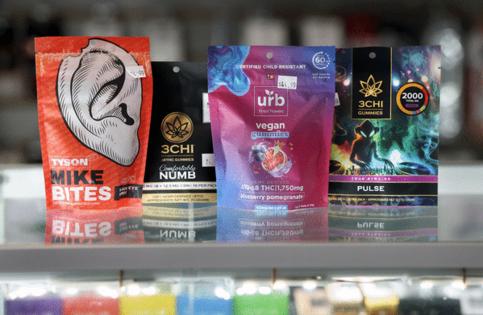Editorial: On dangerous synthetic hemp, Washington comes to Illinois' rescue. Yes, you heard us right
Published in Op Eds
Congress appears poised to effectively ban the sale of intoxicating synthetic hemp products such as delta-8 that have proliferated in gas stations, convenience stores and many other retail outlets in recent years.
This is bad news for Mayor Brandon Johnson and members of the Black Caucus in Springfield, who have shamefully treated this pernicious industry as a potential governmental revenue source as well as an engine of economic development. But it’s good news for the cause of public health, particularly the well-being of children who have been sickened by ingesting these powerful drugs, which take the form of gummies, drinks and other edible treats, oftentimes packaged as if they were candy brands.
And, while it’s possible Congress could revive delta-8 and its ilk in the future, the feds are on the cusp of bringing the embarrassing “debate” in Illinois over hemp to a merciful close.
The hemp language showed up as something of a surprise in the Senate bill to reopen the federal government after the longest shutdown in history; both House GOP leaders and President Donald Trump have expressed support for the Senate-passed measure. Absent a blow-up in the House over the broader legislation, the hemp provisions should become law.
Congress inadvertently opened the door in 2018 to selling these products — every bit as potent as those from available from highly regulated marijuana dispensaries — via the Farm Bill. Since that time, partisan dysfunction has prevented the passage of an updated Farm Bill, which normally is reauthorized every four years. So purveyors of intoxicating hemp have expanded virtually unregulated, with states such as Illinois struggling to impose their own regulations in the absence of federal standards, which is how such products ought to be — and usually are — controlled.
Meanwhile, in Chicago the Johnson administration — bent on coupling future regulations on the sale of delta-8, etc., with taxes on the products — has gone so far as to budget $10 million from such taxes for next year.
Asked by repoters Monday about including the hemp revenues in his budget in light of the developments in Washington, Johnson said, “If anything changes, we’ll make adjustments accordingly.”
Get ready to make some adjustments, Mr. Mayor.
While the hemp industry’s big L in the nation’s capital will make the effort of balancing Chicago’s 2026 budget a little harder, the removal of these drugs from convenience store shelves will prevent future emergency room visits (or worse) for Chicago-area teens. That’s a big win.
Hemp supporters won’t see it this way, of course, but the federal action will remove at least one way local politicians have repeatedly been making fools of themselves.
Readers may recall how in early January Gov. JB Pritzker backed state legislation that would have banned intoxicating hemp sales until a regulatory regime could have been approved and implemented. Heeding objections from the Black Caucus as well as Mayor Johnson, House Speaker Emanuel “Chris” Welch refused to call the bill for a vote even though it would have passed his chamber easily.
Welch promised to produce hemp legislation in the spring, but nothing happened. Pritzker grew so frustrated that he threatened in September to issue an executive order to restrict hemp sales. Hemp industry lobbyists, he said at the time, “have got to understand that people are getting sick. Children are getting sick. Children are able to get a hold of this in a way that they shouldn’t.”
He was right in January, and he was right again in September.
Now, thankfully, the issue appears to be off the governor’s plate thanks to a federal government that at long last is doing the right thing. By the way, curious how Illinois’ senators voted on the matter? Dick Durbin and Tammy Duckworth both backed the effective hemp ban when given the chance to oppose an amendment offered by hemp industry supporter Rand Paul, Republican from Kentucky.
As for those who viewed putting the health of kids at risk as an acceptable cost of generating more government revenue, they should be ashamed. Had the state and/or city even managed to write regulations including minimum ages and the like, the difficulty enforcing those given the massive number of retail outlets selling intoxicating hemp surely would have been unacceptably thin protection.
Legalized marijuana is far easier to police because the number of licensed dispensaries is limited. A similar set-up for hemp was never in the offing.
So thank you to Republicans and Democrats in the U.S. Capitol. When was the last time you could say something like that?
___
©2025 Chicago Tribune. Visit at chicagotribune.com. Distributed by Tribune Content Agency, LLC.
























































Comments